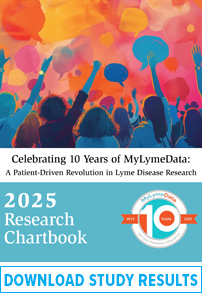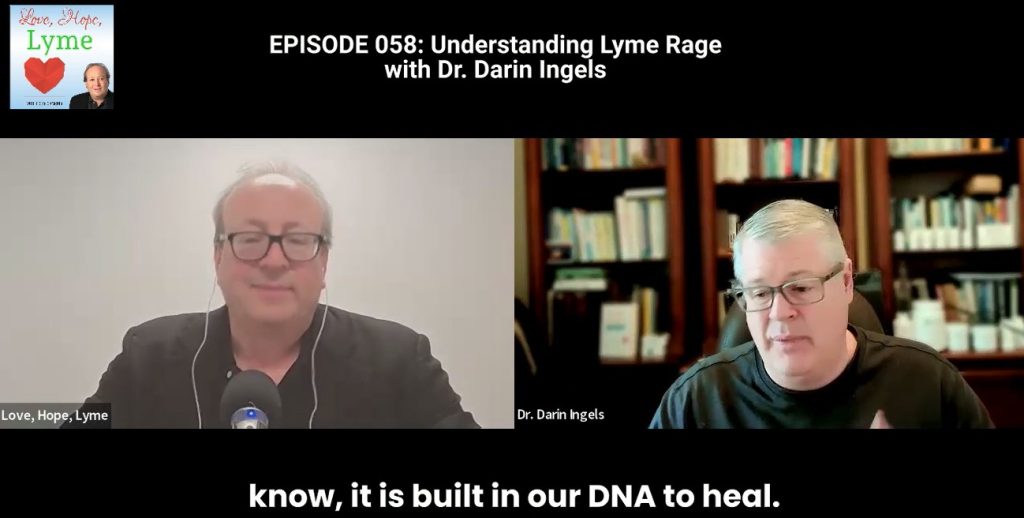Lyme rage: the explosive symptom that can destroy relationships
By Fred Diamond
We often focus on the physical symptoms of Lyme disease such as joint pain, neuropathy, and fatigue. But there’s another symptom that hides in the shadows, misunderstood even by some healthcare professionals: Lyme rage.
This intense, sometimes explosive emotional reaction can alienate friends, damage families, and leave survivors questioning who they are.
On this week’s episode of the Love, Hope, Lyme podcast, I spoke with Dr. Darin Ingels, a Lyme-literate naturopathic doctor, author of The Lyme Solution, and a Lyme survivor himself. We devoted the entire episode to Lyme rage—what it is, why it happens, and how to heal from it.
“These are typically people who aren’t angry people,” says Dr. Ingels. “They’ll tell me, ‘I’ve been a happy-go-lucky person,’ and now they’re having meltdowns over nothing.”
What is Lyme rage?
Lyme rage is not just general irritability. It’s a sudden, often uncharacteristic burst of anger or emotional volatility. Dr. Ingels explained that while it doesn’t affect every Lyme survivor, it’s common enough—and deeply disruptive.
“It’s this ability to flip the switch so quickly,” he says. “You go from fine to furious in a heartbeat. And it often doesn’t feel like you.”
Many people with Lyme report that these emotional outbursts damage relationships and lead to overwhelming feelings of guilt and shame.
“I don’t know that I experienced ‘rage’ per se,” Dr. Ingels says, “but I definitely had personality changes. I felt indifferent to life. I had meltdowns that felt like I was five years old.”
It’s these personality shifts—especially when they seem to come from nowhere—that serve as red flags.
What causes Lyme rage?
Dr. Ingels describes three core mechanisms behind Lyme rage, all of which involve inflammation in the brain:
- Direct Infection of the Brain:
“We have postmortem studies showing Borrelia in and around brain tissue,” Dr. Ingels notes. The immune system’s response to the presence of these pathogens creates neuroinflammation that affects emotional regulation. - Autoimmune Response:
The immune system, to eliminate Borrelia or Bartonella, sometimes turns on the brain itself. “We start seeing antibodies that attack gray and white matter,” he says. - Mast Cell Activation:
Mast cells, typically associated with allergies, also play a role in Lyme. “They dump histamine and other chemicals around the brain, which leads to more inflammation and emotional instability.”
Many survivors describe Lyme rage as a complete departure from their typical personality. Some feel dissociated or emotionally numb. Others feel like they’re watching themselves explode and are powerless to stop it.
“Things that used to spark joy no longer do,” Dr. Ingels says. “You don’t want to go to dinner. You avoid friends. Even people who were very social become isolated. It’s overwhelming.”
He notes that these changes are often abrupt, especially in children or teens, where a diagnosis like PANS (Pediatric Acute-onset Neuropsychiatric Syndrome) may apply. But adults can experience the same kind of inflammation-driven behavioral shifts, even if we don’t label it the same way.
“It’s almost like the effort to participate in life becomes too much,” he says.
Does Lyme rage build gradually or strike without warning?
“Some people feel it coming and can intervene,” he says. “But for many, it just hits like a lightning bolt. They’re fine, and then boom—they’re yelling, crying, or throwing things.”
When survivors do sense it building, Dr. Ingels suggests quick interventions that reduce inflammation—both pharmaceutical and herbal.
“Ibuprofen can help. Curcumin, Boswellia, Harpagophytum all have strong anti-inflammatory effects,” he said. “The key is to calm the inflammation in the brain.”
But for many with Lyme, the rage is sudden and uncontrollable, which means that long-term healing strategies become essential.
The long-term path to healing
How can survivors begin to heal from the neurological and emotional wreckage left by Lyme rage?
For Dr. Ingels, the answer lies in a combination of approaches:
- Herbs and Botanicals:
“I’m living proof that herbs work,” he says, recounting how Chinese herbal formulas from Dr. Zhang helped him feel 85% better after months of failed antibiotic treatments. “There’s a lot of power in plants.” - Immune System Support and Modulation:
The goal isn’t just to kill the bug, but to restore balance to the immune system. “We have to clean up the mess Lyme leaves behind,” he said. “That includes food sensitivities, chemical sensitivities, and even environmental triggers like mold.” - Low Dose Immunotherapy (LDI):
One of the most promising tools in Dr. Ingels’ clinic is LDI, which uses homeopathic dilutions of dead pathogens to retrain the immune system and reduce overreaction. “It’s like telling your immune system, ‘You don’t have to go to war anymore.’” - Oxygen and Energy-Based Therapies:
For those who have access, hyperbaric oxygen therapy and PEMF (pulsed electromagnetic field therapy) can help calm brain inflammation without medication.
“Anything we can do to keep inflammation in the brain down will reduce the likelihood of those rage episodes.”
The emotional toll
Lyme rage doesn’t just hurt the person who is ill. It often creates lasting pain within families and relationships. Many of the people listening to this podcast—and reading this article—carry guilt about the way they’ve lashed out at partners, children, or friends.
I ask Dr. Ingels what he would say to someone who’s struggling with that guilt.
“Have grace for yourself,” he says. “Much of this is reflexive. It’s not who you are. It’s something that’s happening to you because of the inflammation in your brain.”
He speaks candidly about how Lyme changed his own personality and may have contributed to the end of his marriage.
“I didn’t have the words at the time to explain what I was feeling. But I’ve since realized, this wasn’t really me—it was the disease.”
That recognition—while painful—is also liberating. It can offer survivors a starting point for healing, not just their bodies, but their sense of identity and self-worth.
What to tell Lyme patients who feel like giving up?
“You have to be your own best advocate,” he says. “The reality is, we are built to heal. Just because something hasn’t worked doesn’t mean there’s nothing out there that will. Keep going. This is your one life. Don’t give up.”
Click here to listen to all episodes of the Love, Hope, Lyme Podcast or on YouTube.
Fred Diamond is based in Fairfax, Virginia. His popular book, “Love, Hope, Lyme: What Family Members, Partners, and Friends Who Love a Chronic Lyme Survivor Need to Know” is available on Amazon. The e-version (pdf) of the book is always free to Lyme survivors. PM Fred on Facebook or LinkedIn for your copy.





















We invite you to comment on our Facebook page.
Visit LymeDisease.org Facebook Page